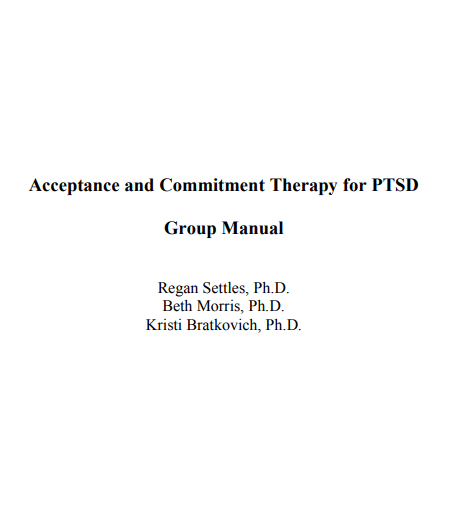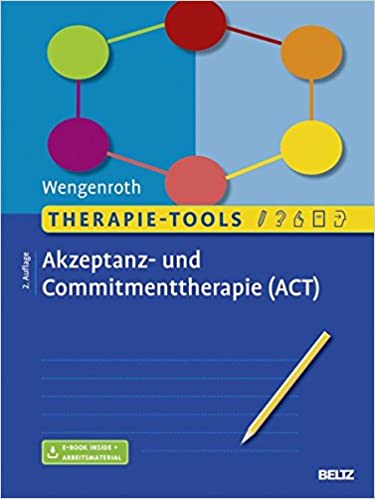Books for Therapists on ACT
ACT is a branch of behavioral therapy, and even though it’s relatively recent, it already has proven effectiveness; however, it’s an approach full of complexities and details, which is why it’s necessary to dive deep into the theory. This section presents some highly important books that shaped and influenced ACT, teaching how to implement it step-by-step, with clear explanations and detailed case studies.
To keep this site running, we are an Amazon Associate where we earn from qualifying purchases. While these links are amazon affiliate links, the selection of books remains accurate and unbiased.
“Act Made Simple” by Harris and Hayes

Acceptance and Commitment Therapy is a rather new approach; nevertheless, it has showed great results for those who make use of it. In this accessible book, author Russ Harris will teach readers that ACT is not only a therapy method, but also a way to view life. Harris will show the principals and techniques of ACT, discussing also six essential process to it.
“Acceptance and Commitment Therapy: The Process and Practice of Mindful Change” by Hayes, Strosahl, and Wilson

Since the original publication of this seminal work, acceptance and commitment therapy (ACT) has come into its own as a widely practiced approach to helping people change. This book provides the definitive statement of ACT–from conceptual and empirical foundations to clinical techniques–written by its originators. ACT is based on the idea that psychological rigidity is a root cause of a wide range of clinical problems. The authors describe effective, innovative ways to cultivate psychological flexibility by detecting and targeting six key processes: defusion, acceptance, attention to the present moment, self-awareness, values, and committed action. Sample therapeutic exercises and patient-therapist dialogues are integrated throughout.
“The Happiness Trap: How to Stop Struggling and Start Living: A Guide to Act” by Harris and Hayes

Are you, like milllions of Americans, caught in the happiness trap? Russ Harris explains that the way most of us go about trying to find happiness ends up making us miserable, driving the epidemics of stress, anxiety, and depression. This empowering book presents the insights and techniques of ACT (Acceptance and Commitment Therapy) a revolutionary new psychotherapy based on cutting-edge research in behavioral psychology. By clarifying your values and developing mindfulness (a technique for living fully in the present moment), ACT helps you escape the happiness trap and find true satisfaction in life.
“Getting Unstuck in ACT” by Harris

Acceptance and commitment therapy (ACT) is a powerful, evidence-based treatment for clients struggling with mental health conditions. As a mental health professional, you may adopt basic principles of ACT easily, but it generally takes at least two or three years of hard work and ongoing study to become truly fluid in the model. During that time, you will probably find yourself “stuck” at some point, and so will your clients. In ****Getting Unstuck in ACT, psychotherapist and bestselling author Russ Harris provides solutions for overcoming the most common roadblocks in ACT. In the book, you will learn how to deal with reluctant or unmotivated clients, as well as how to get past certain theoretical aspects of ACT that some clients may find confusing. This book will help clients deal with sticky dilemmas and unsolvable problems, and will help simplify key ACT concepts to help you break down psychological barriers.
“ACT Questions and Answers” by Harris

Renowned ACT expert Russ Harris presents easy-to-read Q&A sessions to uncover the most common ways clients and practitioners get stuck when using ACT, how to get unstuck, and how to transform that “stuckness” into powerful personal growth. ACT provides innovative tools, techniques, and strategies for promoting psychological flexibility and profound behavioral change. However, there are several challenges and frustrations that can arise when delivering ACT in-session. In this book, you’ll find effective tips and strategies for moving past misconceptions about mindfulness and acceptance, how to deal with reluctant or unmotivated clients, and how to break down communication barriers that can stand in the way of progress.
“Advanced Acceptance and Commitment Therapy” by Westrup

Are you ready to take your ACT practice to the next level? If so, Advanced Acceptance and Commitment Therapy is a powerful resource that can help you streamline your approach and overcome common hurdles that present in therapy. Although ACT is a powerful treatment option for a number of psychological issues, it is a complex, ever-evolving model, and as such, it can often be difficult to deliver effectively. This book is designed to help you close the gap between what you’ve learned in ACT training and your actual client sessions. Inside, licensed psychologist Darrah Westrup, PhD, provides valuable tips and real-life client scenarios to help you hone your understanding of the core processes behind ACT. This thoughful guide is a must-read for any therapist or mental health professional interested in sharpening their ACT skills.
“Get Out of Your Mind and Into Your Life” by Hayes and Smith

What if pain were a normal, unavoidable part of the human condition, but avoiding or trying to control painful experiences were the cause of suffering and long-term problems that can devastate your quality of life? The Acceptance and commitment therapy process hinges on this distinction between pain and suffering. As you work through this book, you’ll learn to let go of your struggle against pain, assess your values, and then commit to acting in ways that further those values. If you’re struggling with anxiety, depression, or problem anger, this book can help―clinical trials suggest that ACT is very effective for a whole range of psychological problems. But this is more than a self-help book for a specific complaint―it is a revolutionary approach to living a richer and more rewarding life.
Want a resource for every situation? We’ve got you covered.
There’s a huge amount of resources for therapists out there. We’ve made a resource for any topic between starting a practice to dealing with a patient problem. Inside you will find books, podcasts, TED talks, worksheets and forums. Sounds like it can help you now or in the future? Simply enter your email and it’ll be in your inbox for you to use!
“Inside This Moment: A Clinician’s Guide to Promoting Radical Change Using Acceptance and Commitment Therapy” by Kirk Strosahl

In this breakthrough book, cofounder of acceptance and commitment therapy (ACT), Kirk Strosahl and two fellow ACT psychologists offer a brief, five-stage model to help you recognize, assess, and take advantage of the subtle shifts of awareness that occur during therapy to achieve the most effective intervention and successful treatment outcomes. Inside This Moment offers a powerful skill set for learning to live in the now—even when it hurts. To help you and your client make the most of your time in treatment sessions, this book includes clinical examples of working with clients via self-related processes, and offers tips for what to do when faced with certain non-verbal and verbal client behaviors.
“Learning RFT” by Torneke

Relational frame theory, or RFT, is the little-understood behavioral theory behind a recent development in modern psychology: the shift from the cognitive paradigm underpinning cognitive behavioral therapy to a new understanding of language and cognition. Learning RFT presents a basic yet comprehensive introduction to this fascinating theory, which forms the basis of acceptance and commitment therapy. The book also offers practical guidance for directly applying it in clinical work.
“The ACT Approach” by Gordon and Borushok

The ACT Approach is the ultimate Acceptance and Commitment Therapy (ACT) resource all clinicians need to more their clients and therapy forward. Combining the foundational knowledge of ACT with practical guidance, strategies, and techniques, you can begin to use ACT immediately with any client that walks through your door. Highly recommended by other ACT experts, this workbook is filled with unique tools you won’t find anywhere else, and includes specific case examples and treatment strategies for anxiety disorders, depression, chronic pain, PTSD, OCD and other issues.
“The Essential Guide to the ACT Matrix” by Polk and Schendorff

The ACT Matrix revolutionized contextual behavioral science. Now, the creators of this pioneering new model present the first detailed, step-by-step guide to help professionals implement the ACT Matrix in clinical practice and improve clients’ psychological flexibility. The ACT Matrix is a seamless fusion of the six core processes of the ACT hexaflex—cognitive defusion, acceptance, contact with the present moment, observing the self, values, and committed action—into a simplified, easy-to-apply approach. This book is essential for any ACT clinician looking to simplify their therapeutic approach in client sessions.
“ACT for PTSD (Treatment Manual)” by Settles, Morris and Bratkovich
https://www.mirecc.va.gov/visn16/docs/act-for-ptsd-therapist-manual.pdf

This manual is a complete and informative guide on how to implement Acceptance and Commitment Therapy, a highly successful approach, fro PTSD patients. It proposes a well-rounded intervention with straightforward instructions and helpful examples to help therapists better understand and implement this potent technique.
“The Reality Slap”

Sometimes it can feel like there’s a gap between what we plan or hope for in our lives and the reality we’re faced with – a so-called ‘reality gap’. Sometimes it’s a startling reality gap caused by the death of a loved one, for example, or a serious illness, divorce or the loss of a job. Sometimes it’s a little gentler: envy, loneliness, resentment, failure, disappointment or rejection. But whatever form your ‘reality gap’ may take, one thing’s for sure: it can cause us great distress. Based on the scientifically proven mindfulness-based approach called ‘Acceptance and Commitment Therapy’ (ACT), this self-help book will teach you how to cope effectively when life hurts and you will learn not only how to survive life’s unexpected curve balls, but also how to thrive, despite them.
“Mastering the Clinical Conversation: Language as Intervention” by Villatte, Villatte, Hayes

This compelling book provides psychotherapists with evidence-based strategies for harnessing the power of language to free clients from life-constricting patterns and promote psychological flourishing. Grounded in relational frame theory (RFT), the volume shares innovative ways to enhance assessment and intervention using specific kinds of clinical conversations. Techniques are demonstrated for activating and shaping behavior change, building a flexible sense of self, fostering meaning and motivation, creating powerful experiential metaphors, and strengthening the therapeutic relationship. User-friendly features include more than 80 clinical vignettes with commentary by the authors, plus a “Quick Guide to Using RFT in Psychotherapy” filled with sample phrases and questions to ask.
“Das Leben annehmen: So hilft die Akzeptanz– und Commitment–Therapie” von Wengenroth

The Acceptance and Commitment Therapy (ACT) on which this book is based is presented in an easy-to-understand and entertaining way, offers novel and very illuminating insights into the causes of human suffering. ACT also shows how we can better deal with the difficult aspects of being human and at the same time further develop our own skills and strengths. This book shows how to create – with the help of simple but proven effective methods – what someone longs for deep inside.
“Therapie-Tools Akzeptanz- und Commitmenttherapie” von Wengenroth

In a therapy based on the ACT approach, patients learn how to implement the approach in their own life and how to align one’s actions with personal values and goals. This manual provides psychotherapists with a wide range of materials to integrate ACT elements into their therapy sessions. New worksheets are available for the following topics: Problem and goal analysis; Progress control; Interpersonal problems; Helpful metaphors; Dealing with crises and difficult emotions; Self-motivation.
Looking for other books or resources?
Check out the ones below, or click below to download all of the resources we have!